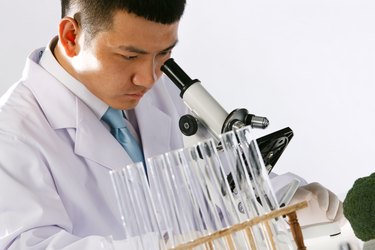
Cloning refers to various techniques of copying genetic information. Reproductive cloning, the most controversial type of cloning, creates copies of whole organisms. While the process of cloning results in two organisms that are genetically identical, the clone faces risks that the original organism does not. Although the technologies that enable cloning continue to improve, most clones as of 2010 do not survive or develop properly for a variety of reasons.
Miscarriage
Video of the Day
Most cases of cloning to date -- September 2010 -- have proven unsuccessful. Scientists have attempted to clone a variety of animals, and in almost all cases, the embryo has failed to develop properly or survive for more than a short period of time. The Genetic Science Learning Center estimates that the success rate of cloning ranges from only 0.1 percent to 3 percent. A cloned embryo, for example, faces the same challenges as a natural pregnancy plus others that are particular to cloning.
Video of the Day
In the process of cloning, a scientist removes the nucleus of the egg, which is the part that contains the genetic information, and replaces it with the nucleus of another cell. In some cases, the two cells involved are not incompatible and the cell cannot survive. In addition, like some transplant patients whose bodies reject the transplanted organ, an egg with a transplanted nucleus may reject the new nucleus by failing to grow and divide. Cloned embryos that survive the initial hours still may fail to implant into the surrogate's uterus. Finally, an established pregnancy can still, at any time and for a variety of reasons, cease growing and result in a miscarriage.
Health Problems
Cloned embryos that survive pregnancy can be born with a variety of birth defects and other health problems. According to the FDA, one phenomenon seen in cloning is that cloned animals tend to be larger than normal at birth, with unusually large organs. Enlarged organs often function improperly, causing problems with circulation, breathing and other bodily functions, sometimes leading to early death. Cloned animals often have malformations of various organs and body parts. In addition, their immune systems may fail to work properly, leading to later disease development.
Abnormal Gene Expression
Genetic material, or DNA, comes preprogrammed so that certain genes are "turned on," or expressed, at certain times while other genes are "turned off." Normal gene expression is integral to normal development of an organism; as cells start to differentiate into different types, such as skin cells, nerve cells and blood cells, genes need to turn on and off in a particular order. Cloned cells, however, may lack the programming necessary to tell genes when to turn on and off. The result may be disorganized cell growth or inappropriate cell functioning, both of which can lead an organism to die.